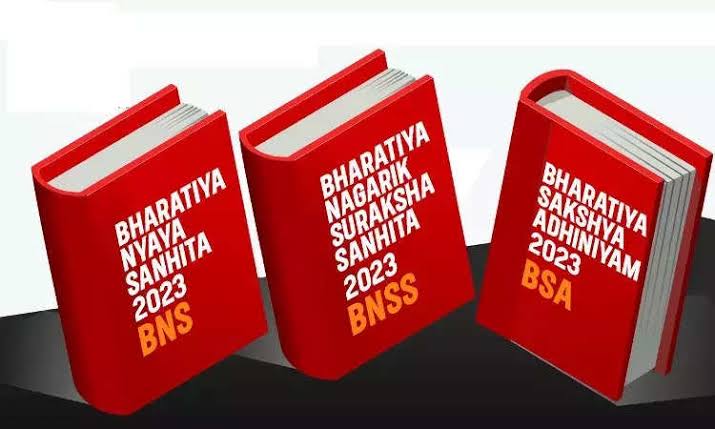All societies are founded on laws that establish justice, security, and individual rights. We are responsible as citizens, and we must learn how to read the laws that govern us. Bharatiyan Nyayativu Sanhit (BNS) 2023, the new criminal codes namely BNSS 2022, BSA 1926 and BRS 2020 are India’s major moves towards modernization of its legal system. This move represents an important milestone for Indian civil society.
The Indian Penal Code (IPC) 1860, Code of Criminal Procedure (CrPC), 1973 and Indian Evidence Act (1872) have been replaced by these new acts to make justice more efficient, transparent and compatible with technology. Only when people are aware of laws can they make them become effective. Accordingly, legal knowledge and public awareness are essential.
The citizens must be informed about these alterations. In what ways do the new criminal laws impact us? What rights and responsibilities do we have under them? Let’s address these points together.
What are the reasons behind requiring public disclosure regarding the latest criminal offenses?
It is imperative that the public is made aware of any significant changes in the legal system. Those who fail to follow laws may experience confusion, fear or even unintentional violation. Three new laws are intended to simplify legal procedures and provide swift justice, but their effectiveness can only be realized if we, as the public, acknowledge them.
Public awareness campaigns allow us:
To know our legal rights and obligations.’ The.
Stay away from potential legal consequences resulting from ignorance.
Provide victims with legal recourse.’
Support law enforcement agencies by collaborating effectively.
Efforts have been made by various agencies, including the Jammu and Kashmir Police, to increase awareness about the issue of law and people. They are also promoting mass awareness campaigns that help spread awareness of these laws throughout the region.
The three new criminal legislations are the primary points of interest.
1. Bharatiya Nyaya Sanhita (BNS) 2023, The New Penal Code
This legislation replaces the IPC and introduces harsher punishments, enhanced victim protection, and quicker delivery of justice.
Some key amendments:
Terrorism and organized crime are explicitly defined and have severe penalties attached to them.
Mob lynching is now a specific crime with life imprisonment or the death penalty.
Community service has been made a penalty for petty crimes.
Tougher laws against women and child crimes, including quicker trials of rape cases.
These reforms translate into a more transparent and detailed penal system to deal with contemporary challenges.
2. Bharatiya Nagarik Suraksha Sanhita (BNSS) 2023, The New Criminal Procedure Code
The law supplants CrPC and aims at accelerating trials and procedure friendliness for victims.
Key highlights:
Use of technology: FIRs are now being filed online, and police can take witness statements through video calls.
Time bound justice: Courts have to complete trials within particular time frames for serious crimes.
Increased accountability on police: Tightly regulated rules for arrests, investigations and custodial rights.
For all of us, this law is bringing more efficiency and transparency in legal processes.
3. Bharatiya Sakshya Adhiniyam (BSA) 2023, The New Evidence Law.
This act supersedes the Indian Evidence Act and incorporates contemporary evidence collection techniques, including electronic evidence.
Some of the key amendments:
Electronic evidence such as WhatsApp messages, emails, and CCTV footage are accepted in court.
Stiffer penalty for evidence tampering.
Witness protection laws to guarantee security while giving evidence in court.
What this implies is that evidence gathering and trial proceedings will be more credible and tamper-proof than ever before.
Role of Jammu and Kashmir Police in Disseminating Awareness.
The enforcement of new laws succeeds only when the people know them. Realizing this, the Jammu and Kashmir Police have been working extensively on awareness drives in various districts.
Their initiatives are:
Conducting workshops and seminars for students, professionals, and general citizens.
Conducting public meetings in rural and urban pockets to make people aware of the main provisions of the new laws.
Social media campaigns to ensure that information reaches all.
Coordination with colleges and schools to inform youth about legal updates.
These programs are actually doing some good by empowering citizens with legal information and making sure that the new legislation is enforced successfully.
How Do We Enhance Legal Literacy?
While the police and government are doing their share, we as responsible citizens also need to do our part. Here’s how we can enhance legal awareness in our neighbourhood.
1. Educate ourselves and others.
Read about new laws from reliable sources.
Talk about these laws with colleagues, friends, and relatives.
Join workshops and awareness campaigns.
2. Leverage Technology for Legal Awareness.
Visit official government and police websites regularly.
View legal awareness videos on social media and YouTube.
Access legal aid applications and online grievance portals.
3. Encourage Youth Engagement.
Schools and colleges should incorporate legal literacy courses.
Encourage students to engage in debates and discussions about legal matters.
4. Assist Victims and Foster Legal Reporting.
If you see a crime, report it responsibly.
Assist victims by directing them to legal aid services.
Foster confidence in law enforcement agencies by assisting them.
It is not only the lawyers’ and police officers’ responsibility to know the three new criminal laws, it is also our responsibility. These laws are part of our daily lives, and knowing them can safeguard us, empower us, and make us a law abiding society.
The initiatives of the Jammu and Kashmir Police Police Staion Boniyar led by Station House Officer Shsbir Ahmad Beigh in legal awareness are appreciable, but the actual change will occur when all of us take an active interest in learning and disseminating legal knowledge.
We need to ask ourselves: Do we know our rights? Do we understand how the new legal system operates? Are we prepared to be informed citizens?
The more we learn, the more powerful our legal system will be. Let’s start today.
(Writer is a Teacher, Author, Writer and Columnist Hails From Boniyar Baramulla and He Can be reached at [email protected]






